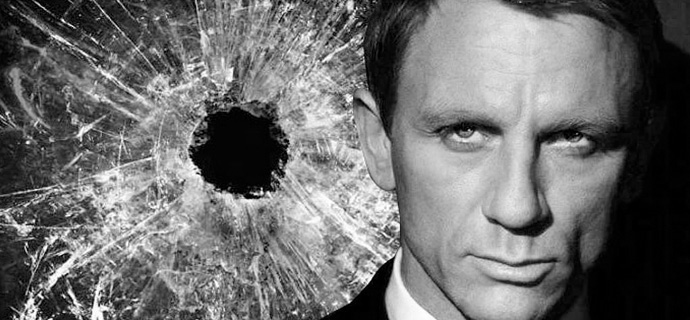(M) Starring Daniel Craig, Christoph Waltz, Léa Seydoux
Continuing the story where Skyfall left off, the newest chapter in the saga of legendary MI6 agent James Bond sees the British intelligence community in disarray. MI6 boss “M” is dead and a government agency is trying to make the secret agents obsolete. After leaving a personal mission in Mexico City, Bond finds himself suspended from the agency. But during that dramatic mission, he gains a lead on a mysterious organisation called Spectre that is connected with terrorist activity around the world. Naturally, he decides to keep busy during his suspension. As he digs deeper into his new-found information, he not only discovers that this group is a threat to the world’s security — but he also is forced to confront more elements from his past.
Before Spectre takes over the world, Bond must follow his leads and instincts to thwart the plans of this mysterious force, as well as answers his own suspicions.
Given Spectre is the 24th Bond film, comparisons are inevitable between Spectre and the 007 adventures before it. In comparison with Skyfall, this spy outing is second best, but on the scale of all Bond films, Spectre would still be near the top of the pile. It is not as groundbreaking as its predecessor, because it is more of the second chapter to James Bond’s history. What was captivating about the first Bond film directed by Sam Mendes (American Beauty) was his cinematic eye and preference for majestic scenery. His usage of cinematography is stunning but, during Spectre, Mendes can have a tendency to linger a bit too long for an espionage tale.
The beautiful worldwide landscapes can be a strength and a weakness for Mendes and, for Spectre, it is the latter. This Bond film is too long, because 007 must traverse through extensive scenery in some of the world’s most picturesque locations. Fortunately, the beautiful scenery is pieced together with brilliantly choreographed chase sequences, fight scenes and a captivating support cast that save this episode within the franchise.
Daniel Craig continues to confidently hold onto the mantle of 007 and he proves that he still deserves to be the face of the franchise. Admittedly, he is one of the best Bonds and will be hard to replace. His only limitation is the character of James Bond himself.
Spectre shows the value of the agent program, but the challenge is to the ideology of 007’s qualities. He looks great in the vast array of costume changes, he proves his moxie in any fight scene, but the treatment of his lead women seems a bit antiquated. To have these strong female characters go weak at the knees for the British agent becomes comical in this modern era. The crowd actually laughed before one of the inevitable scenes of passion. To see Monica Bellucci and Léa Seydoux become putty in his hands within moments of meeting the secret agent seems unbelievable and is a waste of some of the best women to cross paths with the martini-drinking assassin.
What differentiates great Bond films from the mediocre is the villain and this is what makes Spectre a distant second to Skyfall. In this outing, Mendes has to deliver three villains in an attempt to defeat Bond. Christoph Waltz (Inglourious Basterds) has made a career of portraying cinematic villains, but this one is a miss. He has the voice, but not the presence to go toe to toe with Daniel Craig’s interpretation of Bond. The two-time Academy Award winner has the acting chops, but he is not allowed to develop this character to much more than a shadow of Silva (Javier Bardem) in Skyfall.
Mendes attempts to add muscle to the fight against the MI6 team by including Dave Bautista (Guardians of the Galaxy) as the assassin, Hinx. Unfortunately, like the women in Spectre, he is under-utilised and it is completely unbelievable that Craig could deliver any sort of damage to this hulk of a man. The saving grace for the villainy factor was Andrew Scott (Sherlock) who brings the needed smarmy elements to provide the dark side to this tale of espionage.
In the long history of Bond films, Spectre still qualifies as one of the better choices. It suffers by having to follow the groundbreaking Skyfall. Sam Mendes has put his stamp on this franchise but I hope he is willing to pass the baton on to the next director to continue the Bond tradition. Fortunately, Daniel Craig and the MI6 team prove that they can carry this franchise for another day and suggest a promising future for Bond.
One of the major elements of Spectre that will stay with you long after the lights come on is the issue of control. Who is really in control of this world? Watching Spectre leads one to think that with the right amount of money and information, anyone could run this world and control the lives of all on the planet. James Bond manages to prove that this is merely a pipe-dream for the world’s wealthiest.
The Bible makes clear that even when this world seems out of control, there is one who is all-knowing, all-powerful and everywhere.
The God of the Bible continues to prove that despite what the media and entertainment tell us, he is in control.
Good, but not great. Beautiful, but not breathtaking. Fun, but forgettable. Spectre proves to be a good follow-up to Skyfall and worth your time.
What are some of the bigger questions to consider from this film?
- Who is in control of this world? (Joshua 1:9, Proverbs 19:21)
- What does the Bible say about hope? (Jeremiah 29:11, Roman 8:24-25)
- Where do I turn when I am in trouble? (John 16:33, Philippians 4:6)
Russell Matthews works for City Bible Forum Sydney and is a film blogger












